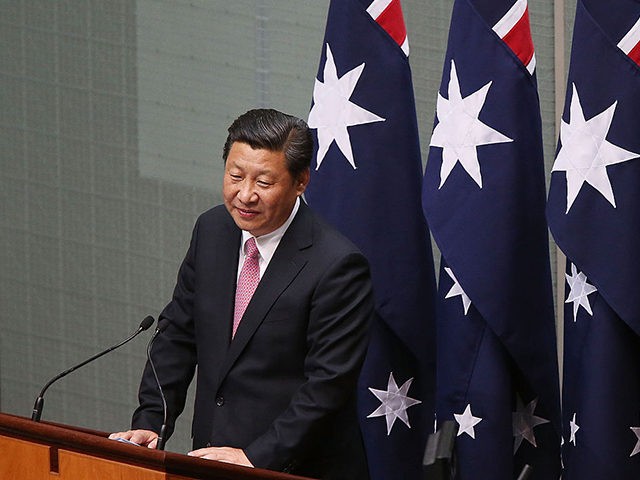China on Thursday announced the suspension of economic dialogue with Australia amid deteriorating relations over human rights issues, Chinese espionage and political interference, and Australia’s withdrawal from two projects tied to China’s Belt and Road Initiative (BRI).
France24 described China’s action as “a largely symbolic act of fury,” the latest step in a process of deteriorating relations that began with Australia’s insistence on an independent probe into the origins of the Wuhan coronavirus.
China has been waging an increasingly intense trade war against Australia, coupled with diplomatic pressure and some very ugly propaganda, in an effort to bully Canberra out of demanding that coronavirus investigation.
The origins of Australia’s showdown with China predate the coronavirus pandemic, however. Australia has been pushing back against what a top-secret 2018 Australian intelligence report characterized as “brazen and aggressive” Chinese interference in Australian politics.
Disturbing links have emerged between Australian politicians and the Chinese Communist Party (CCP), most spectacularly in the case of Senator Sam Dastyari, who resigned in 2017 amid a Chinese influence-buying scandal. Chinese agents allegedly tried recruiting other candidates to run for office in Australia and posed as journalists to conduct intelligence operations.
Australia withdrew from two controversial BRI deals with China last month, calling them “inconsistent with Australia’s foreign policy or adverse to our foreign relations.” Beijing reacted with predictable fury, slamming the Australians for their “Cold War mentality,” the CCP’s all-purpose insult for everyone who grows uneasy about doing business with the brutal Chinese tyranny. The Chinese government threatened Australia with “serious consequences” for pulling out of the BRI agreements.
Australia is also considering early termination of a state-owned Chinese company’s 99-year lease on the important port of Darwin, a deal the wisdom of which the U.S. government strongly questioned when it was signed in 2015. There is mounting unease in the Australian military about allowing a Chinese state firm to have such control over the port.
China’s National Development and Reform Commission repeated the “Cold War mindset” insult Thursday when it announced the “indefinite” suspension of the China-Australia Strategic Economic Dialogue, a theoretically important series of bilateral trade meetings inaugurated in 2014 that has not involved any actual meetings since 2017.
In essence, China suspended a program that has not actually done anything of significance since around the time of the Sam Dastyari scandal. The Chinese government attached great importance to Thursday as marking the first time China has officially frozen a diplomatic channel with Australia, inactive though it might have been.
The Australian government called China’s symbolic action “disappointing” and the Australian dollar briefly dipped about 0.6 percent in response to the news before recovering, possibly due to apprehension that China might follow up by altering or canceling active trade agreements with Australia.
Chinese officials and academics told the state-run Global Times on Thursday that suspending the China-Australia Strategic Economic Dialogue was a “substantial and resolute response” to Australian “aggression,” sending a “clear signal” to Canberra that Beijing will “take all necessary moves to defend its national interests in response to Australia’s provocations.”
“The suspension is a strong political gesture and indicates that more bilateral government-to-government communication avenues would likely to be put on hold, trade deals would shrink drastically and bilateral relations would sink from ‘deadlock’ to ‘implosion’ if Canberra does not exhibit good faith measures to repair bilateral relations,” the Global Times warned.
“Chinese observers” sniffed to the Global Times that until Australia begins displaying the “right attitude,” reverses “wrong decisions” like cancellation of the BRI deals, and abandons “the fantasy that China may retreat on Australia’s unreasonable provocations,” there is no point in further negotiations.
The CCP paper threw in a little infographic showing how “Aussie misdeeds” have created a fracture in Chinese-Australian relations that threatens to become an earthquake. Australia’s insistence on investigating the origins of the Chinese coronavirus was prominently featured as a fault line, and the last Australian “misdeed” depicted was the review of the Darwin port lease, which the Chinese are strongly implying could be the trigger for stronger retaliatory measures.
“In spite of China’s repeated representations, Australia has used national security as a ruse, restricting and cracking down existing cooperation projects in trade, economic and people-to-people exchange between the two countries, which severely hurt the mutual trust and impaired political cooperation foundation between the two countries,” Chinese Foreign Ministry spokesman Wang Wenbin thundered at a Thursday press conference.

COMMENTS
Please let us know if you're having issues with commenting.